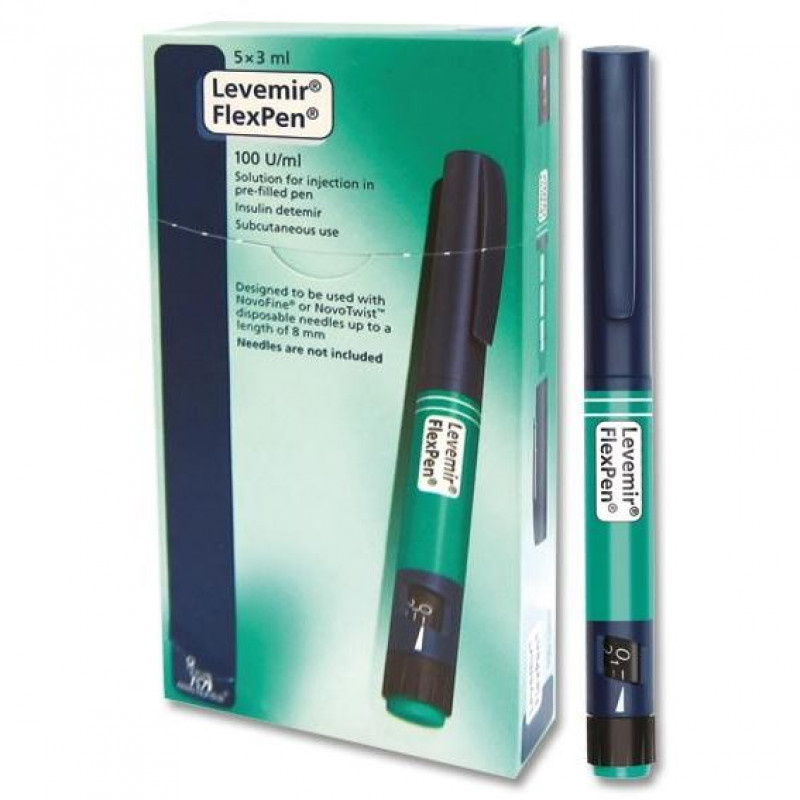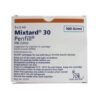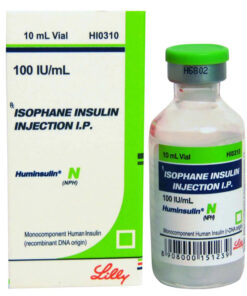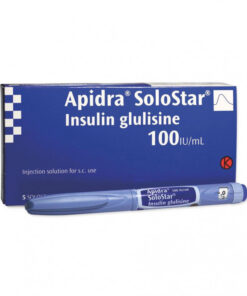Levemir Flexpen
115.00$ Original price was: 115.00$.89.00$Current price is: 89.00$.
- Novo Nordisk
- Insulin,
- International Warehouse 2
Insulin is a highly anabolic and powerful hormone produced by all human beings and is essential to a well-functioning individual. Although produced naturally by the human body, insulin is often administered exogenously to those suffering from diabetes. Some performance athletes also use it in an effort to grow lean tissue. However, off-label use can be potentially fatal; extreme caution is advised.
Although all human beings naturally produce insulin, exogenous insulin first appeared in the 1920’s. This was not a synthetic model, but rather extracted from the pancreas of dogs and latter cattle and pigs. While purity was a major issue of concern, the use of exogenous insulin was highly praised as it would save the lives of numerous individuals. Diabetes without insulin treatment can easily be fatal, and while animal extract isn’t pure any impurity issues were considered worth the risk when death was the alternative. However, by the 1970’s purity issues had been greatly resolved, and in 1975 Ciba would introduce the first batches of synthetic insulin to the market. A few years later in 1982, the synthetic version would be perfected even more with the introduction of Humulin-R, which is a perfect copy of human insulin and approved by the FDA.
Insulin Functions & Traits:
Insulin is produced by the pancreas and is officially classified as a peptide hormone. On its functional basis, insulin is responsible for the utilization and regulation of glucose, amino acids and fatty acids. It is also responsible for preventing the metabolic breakdown of glycogen, fat and protein.
For the diabetic patient, there are two types of diabetes that can make insulin necessary. Type I diabetes patients, normally a condition that occurs naturally, do not produce enough insulin on their own to meet their body’s needs. Type II diabetes patients do naturally produce insulin, but the body does not recognize it at the cell site, or at least not at a suitable level. Type II diabetes is most commonly brought on by obesity.
As a peptide hormone secreted by the pancreas, insulin in a positive fashion acts on the liver in order to stimulate the formation of glycogen to glucose. This action further inhibits the formation of non-carbohydrates to glucose. From here, insulin actively promotes the facilitated diffusion of glucose through cells, which has the ability to promote muscle tissue growth. High levels of insulin have been directly linked to enhanced protein synthesis. High levels of insulin have also shown to significantly promote increased bone density as well as increasing the production of Insulin-Like Growth Factor-1 (IGF), a highly anabolic hormone in its own right and structurally similar to insulin.
The functions and traits of insulin do not end there; this hormone has been shown to facilitate an increase in Luteinizing Hormone (LH) and Follicle Stimulating Hormone (FSH). With this increase in LH and FSH, this can potentially increase the production of testosterone in the body. Although the LH and FSH promotion is not notably strong, it is notable enough to mention.
Effects of Insulin:
Regardless of the type of diabetes an individual may suffer from, regulating the control of blood sugar can largely sum up the effects of insulin. Due to its strong anabolic and anti-catabolic properties, insulin can also be beneficial to various athletes. Unfortunately, the use of exogenous insulin for off-label use, those who do not suffer from diabetes, has the potential to promote significant body fat gain. It can also lead to an untimely death if the proper steps of use are not followed.
Regardless of the risk, due to the anabolic and anti-catabolic effects of insulin, some athletes find the hormone worthwhile. However, it can only be worthwhile if body fat is controlled. While perhaps a bit simplified, when insulin levels are high the body’s ability to burn stored body fat is greatly decreased. Due to the potential negative effects of insulin on the metabolism, those supplementing for performance purposes will need to hold to a strict diet that is well planned and thought out. The individual will want to be careful with his calories and fat intake. This will help to ensure glucose and protein is stored in the muscle tissue rather than adipose tissue. Due to the need to control the metabolic effects and maximize the anabolic effects of insulin, the individual will find the best time to take insulin is immediately following an intense weight training session. When administered, this should be accompanied by food; we’ll go over this in the administration section.
Due to the effects of insulin on anabolism, large amounts of lean muscle mass can be built in a relatively short period of time. It is hard for many men to control the potential body fat gain, but it can be done under the right circumstances. The use of anabolic steroids along with insulin as well as Human Growth Hormone (HGH) is normally advised in a performance setting. This will not only promote more growth, but the addition of anabolic steroids and HGH will help the individual tremendously as it pertains to controlling body fat.
Brand
Novo Nordisk
Be the first to review “Levemir Flexpen” Cancel reply
Related products
Insulin
Insulin
Insulin
Insulin
Insulin
Insulin
Insulin











Reviews
There are no reviews yet.